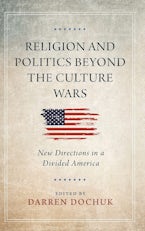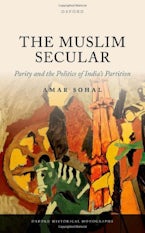- Home
- religion
- history
- political science
- Religion and Politics Beyond the Culture Wars

Religion and Politics Beyond the Culture Wars
New Directions in a Divided America
Edited by: Darren Dochuk
370 Pages
- Hardcover
- ISBN: 9780268201296
- Published By: University of Notre Dame Press
- Published: October 2021
$55.00
US Americans are more deeply politically divided than ever before, and religion has a lot to do with it—at least that is the story often told by news outlets today. Since James David Hunter coined the term “culture wars” in 1991 and Pat Buchanan’s speech at the Republican National Convention a year later, the popular consensus has been that religion is almost always a polarizing force and not an ambiguous, malleable reality that forms an essential part of democratic pluralism. As a result, historians of politics in the US have often overlooked the crucial role that religion has played in US American politics, especially as a complicating factor in the culture wars narrative. Religion and Politics Beyond the Culture Wars: New Directions in a Divided America is a rich collection of fifteen essays by historians seeking to complicate the culture war narrative and to place the role of religion at the heart of US history.
David Dochuk, the book’s editor, introduces the culture wars narrative, its shortcomings, and the new trajectories offered by the volume’s contributors. As a unit, the book seeks to “reveal, map out, and account for the dynamic pluralism of religious belief, practice, and politics that has long operated beyond and in between the rigid binaries we typically associate with our current moment” (11). The first part does this by taking up new religious subjects and methodologies not typically centered on political history. Janine Giordano Drake, for example, turns to the labor radicals of the early 20th century, taking their faith convictions as authentically “Christian” responses to labor and economic injustices. Christian socialists and workers, Drake shows, enacted the spirit of Christianity in ways that challenged the power structure of the mainline liberal social gospelers. Josef Sorett expertly explores the politics of black religion and pluralism in Phylon, a journal published at Atlanta University and edited by W.E.B. Du Bois. In its editorials and artistry, Phylon advanced a particular “black subject” and construction of “black religion” that participated and upheld liberal Protestantism (62). Joseph Kip Kosek’s exploration of “agrarian dissenters” in the 1930s and Patrick Mason’s analysis of environmentalism continue part 1’s exploration of overlooked and understudied religious subjects in political history.
Part 2 continues the collection’s trajectory of complicating historical narratives of the culture wars by moving beyond the typical methodologies used to approach religion and politics. Contingency, irony, and surprising alliances feature just as often in the story of religion and politics in US history as polarization does. Wendy Wall’s analysis of religious support for immigration reform in the post-World War II era helps uncover how it both unified and fractured the so-called “‘tri-faith’ vision of America” (104). Immigration reform intersected with issues of family planning and concerns about overpopulation, creating both divergences and alliances between Jews, Catholics, and Protestants advocating for immigration reform (109). Mark Brilliant’s account of progressive support for school vouchers demonstrates how a position now almost universally associated with conservatives was once a liberal issue grounded in matters of choice (132). Andrew Preston and Matthew Sutton take up the matter of religious liberty for Jews as they excavate the history of religious missionaries for the CIA.
Religious actors have different reasons for forming political alliances. The more political historians uncover the surprising and dynamic relationship between religion and politics, the more clearly the role of religion becomes in US political history. Part 3 is the book’s strongest section, with several wonderful contributions that demonstrate the upshot of the book’s argument. Kathleen Cummings, Benjamin Francis-Fallon, and Michelle Nickerson all explore—in different ways and engaging different time periods—how “Catholicism” is more than a set of interior beliefs or outward practices. It is also a deeply religious and political category and tradition that different actors are impacted by, or assigned to, for political reasons. These historians seek to contextualize, historicize, and pluralize the culture war narrative. Keith Woodhouse extends this to the issue of environmentalism in late 20th- century politics. Kate Bowler demonstrates how the political alignment of Latino megachurches is anything but settled, showing how differing approaches to the economy develop in conversation with political concerns. James Kloppenberg’s fascinating account of the influence of the Catholic political imagination on President Barack Obama brings the volume to a close.
Political historians have been taking religion more seriously of late and this volume shows how powerful and important that attention can be in our present moment. The best essays are those that illustrate how a more pragmatic approach to religion and religious actors actually demonstrates how the culture wars narrative is deeply contingent and stands on shifting ground. One upshot of this collection is its illustration of the value of reconsidering traditions like the social gospel, which (as Drake, Sorett, and Kloppenberg demonstrate) was anything but a singular, simple, or bygone religious and political tradition. This volume is of value to religious and political historians, of course, but also to political theologians and ethicists who recognize that their work lies between and beyond the binaries of our current moment.
Aaron Stauffer is the Louisville Institute Postdoctoral Fellow and Director of Online Learning at Vanderbilt Divinity School.
Aaron StaufferDate Of Review:February 27, 2023
Darren Dochuk is the Andrew V. Tackes College Professor of History at the University of Notre Dame. He most recently authored Anointed with Oil: How Christianity and Crude Made Modern America and is editor and co-editor of a number of books, including American Evangelicalism: George Marsden and the State of American Religious History (University of Notre Dame Press, 2014).











